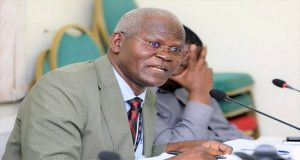
By Executive Editor
Makindye Magistrate Court has exposed the National Social Security Fund (NSSF) over a case the latter filed in a land matter.
The land in contention is comprised in FRV WAK 6104 Folio 24 Bloc 29 Plots 3234–3240 in Lubowa, Wakiso district.
In 2015, the Fund accused Mohammed Lubowa, Moses Bogere, Betty Namanya, Daphine Nakanwagi, and Patrick Onyango of fraudulently procuring a certificate of title in contravention of Section 190(1) of the registration of the Titles Act 230 laws of Uganda. The accused persons were charged in court.
On April 17, 2024, Makindye Magistrates Court ruled against the NSSF and acquitted the accused persons.
Makindye Grade One Magistrate, Elisha Arinaitwe, cited “glaring inconsistencies in the evidence of the prosecution witnesses.”
The Lies
Although the NSSF was expected to prove that there was a procurement of title in a fraudulent manner and that the accused persons were responsible, the Fund did not. In any case, the NSSF resorted to forgeries.
For instance, all documents presented by the NSSF for purposes of prosecution were found to be fake. This comes after document examiner Sylvia Chelangat told the court that she and Erisa Ssebuufu found out that signatures marked (A,B,C,D,E,F,G,H,I,J,K,L, M,N,O, Oa, and Ob, did not write the questioned signatures in comparison with signatories provided. Secondly, the seal impressions were not the same. “They were distinct in size of letters, radius of the stamp, and excess words,” reads part of the ruling.
She, however, told the court that some of the documents she analyzed were photocopies and that the photocopies had limitations. Chelangat also found some documents to be missing, yet they were attached at some point in the prosecution.
“I am aware that my responsibility at this level is to determine whether a prima facie case was made out sufficient to put the accused on defense. I have carefully considered the evidence on record as I have labored to relay it above. I wish to state that the state has the burden of proof in criminal proceedings, which is to prove every ingredient of the offense to the required standard beyond reasonable doubt. This is not one of the cases where this burden shifts,” said Arinaitwe.
Witnesses
The NSSF paraded over six witnesses in the matter. However, all their statements were not coordinated. “These witnesses are liars,” said Arinaitwe. “It is my finding that they are the very witnesses who performed acts alleged to have been performed in procuring the impugned titles. They are not worthy of any belief.”
Documents
According to Arinaitwe, copies of scanned documents uploaded on the system were not the same as those shown to witnesses while recording their statements. “The originals were very different from what was uploaded on the system,” said Arinaitwe. According to Arinaitwe, the mode of recovery of documents, the mode of custody of evidence, specifically the experts report, inconsistencies in the evidence of witnesses, which caused them to lose credibility in the eyes of the court, and the failure to examine the documents uploaded on the system as against sample signatures and stamps were the turning points in the case. “These inefficiencies left a lot to be desired about this investigation,” said Arinaitwe.
Inconsistencies
In his ruling, Arinaitwe said that “there were glaring inconsistencies in the evidence of prosecution witnesses.”
“These contradictions and many others on record taint the evidence of such witnesses with suspicion. No court can rely on such evidence. These are deliberate falsehoods, and these render the entire evidence suspect and unworthy of belief.”
In conclusion, Arinaitwe said, “I have properly examined evidence on record. My finding is surely that this evidence has left doubt in my mind. I resolve this doubt in favor of the accused.”
“No court can rely on such evidence. These are deliberate falsehoods, and these render the entire evidence suspect and unworthy of belief,” he said.
For these reasons, Arinaitwe said, “I find no case again against all the accused persons, and I acquit them forthwith.”






